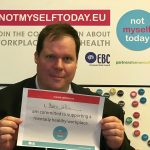Le coût des risques psychosociaux dues au travail à 617 milliards d’euros par an. C´est exorbitante au regard des bénéfices des politiques de prévention.

Employers should put employees´ mental health at the very top of the agenda especially at this time of ongoing and continuous changes in the labor market that are affecting a key dimension of job quality – health and safety – and which are contributing to the increase of psychosocial risks at a great extent.

On 17 October 2016, the platform that Eurocadres took the initiative to create on EU-wide whistleblower protection was launched. 48 organisations participated from the start, and more are joining. The case for why whistleblowers should be protected is clear.

Psychosocial health risks and mental health is a big challenge. The European Commission must change the main directive on occupational health and safety.

High-level research needs mobile researchers. But changing jobs can affect pension savings negatively. Pensions have therefore been identified as an obstacle to mobility for researchers and RESAVER proposed as a remedy.

The ability to create something new and valuable lift up individuals and teams, and takes them out of anonymity and gives life and colour to an active career.

Professional mobility is an important tool for career development for European professionals, both in terms of geographical and occupational manners.

We have had a couple of weeks’ time to reflect on the New Skills Agenda for Europe. Eurocadres is worried about skills gaps and skills mismatches.

“How much can schools can adapt their curricula to fight radicalisation by encouraging more inclusiveness and integration in society as well as the labour market?”… These topics, questions in public debates and news caught my attention.

The introduction of the European Professional Card (EPC) this year is one of the major achievements of the modernisation of the Professional Qualifications Directive. But only few professions are the lucky ones to have established such a card.

Rather than a development creating more obstacles for Transatlantic mobility the EU should work for making it easier to work and travel across the pond.

The globalised, high-tech economy means that the economic and social environment for which academic staff must prepare students and researchers, and in which they must embed research and innovation, is evolving.

Two things that we need more of to promote equality: women in company boards and management and men on parental leave.

In order to cope with what is a real public health concern, businesses must stop “dumping” their senior workers, and instead adapt so as to accommodate their specific skills and requirements, if they want to be socially responsible.

Face à ce qui est un véritable problème de santé publique, les entreprises, si elles veulent être socialement responsables, doivent cesser de « jeter » leurs salariés seniors mais adapter les organisations à leurs compétences et à leurs spécificités.

New technologies and an ever faster changing labour market requires of employees to adapt their skills and competences to stay employable. Trade unions have huge potential to accompany their members in this process.

The social partners need to take on the issue of mental health at work. Mental disorders are very common in Europe and are a major burden on society. There is also a need to clarify in legislation that occupational health and safety at work is not only about the physical workplace.

Everything a trade union does or says has an organising perspective. We communicate key political messages and we talk about image and, not least, how to become attractive and relevant for potential members. In Europe there are millions of them out there.

The financial crisis and the lack of jobs have caused brain drain, increasing migration of highly educated and skilled workers from the South and East to seek work in the North and West of Europe.

Many efforts are put in sensitising employers and employees to adhere the necessary attention to psychosocial risks.

